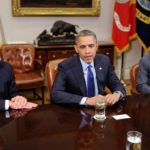The debate over healthcare and insurance is one that is best understood and appreciated by people who know what it’s like to be sick and not be able to afford the needed treatment. Years ago, I suffered what was supposed to be minor stomach flu. I had all the classic symptoms: nausea, diarrhea, cramps, and fever. The cramps went from bad to worse, and while I feared that what I was suffering might have been worse than the stomach flu, I made Google my doctor and refused to go to the hospital because I did not have health insurance, I could not afford to get health insurance, and the alternative of paying out of pocket was not an alternative for me.
So I suffered in silence. I put up a brave face and told my mother that it was not half as bad at all, that the pain would subside. I lost weight because I could not hold food down, and everything I took to suppress the nausea only made it worse. I got weaker by the day – and still refused to tell my mother how bad my pain was – and I prayed each night that I would not die. My stomach was so empty that when my stomach muscles spasmed to vomit its contents, there was nothing coming out, but the pain of trying broke me down. Then one day, I began to throw blood up; that was when I knew it was serious.
I was rushed to the hospital where I was diagnosed with gastroenteritis and severe dehydration. While on the hospital bed, I thought mostly about how much this trip would cost me, and how on earth my mother will afford it. We were blessed to get treatment and have the option of financing the bill.
So when the Cameroon American Council, a nonprofit organization that was said to be the first of its kind by the Washington Post, invited me to be a part of the Press delegation that would attend a town hall meeting about health, I was all too willing. The town hall meeting held at the White House on Monday, February 25th 2013 and boasted of professionals that were knowledgeable and passionate in their respective fields in the U.S. Department of Health & Human Services. Some of the speakers were Damon Davis, Director for the Health Data Initiative, Dr. Nadine Gracia, Deputy for Minority Health, Mayra Alvarez, Director of Public Health Policy, and many, many others.
The Affordable Care Act, in the words of Anton Gunn, the Director of the Office of External Affairs, “will expand access to coverage for millions of people who don’t have access to coverage.” Specifically, the Affordable Care Act makes it even possible to buy coverage, to have affordable coverage, and to be protected as a consumer. It also makes it illegal to be denied coverage for having a pre-existing condition and for reaching a limit on insurance coverage.

L-R: Damon Davis (Director for the Healthcare Initiative), Chiquita Brooks LaSure (Deputy Director, Consumer Information & Insurance Oversight), and Anton Gunn (Director, Office of Internal Affairs)

L-R: Sam Kass (Assistant Chef and Food Initiative Coordinator), Caya Lewis (Counselor to the Secretary), Dr. Nadine Gracia (Deputy Assistant Secretary for Minority Health), and Acacia Salatti (Center for Faith Based & Neighborhood Partnerships)
A huge part of this Act is the free preventive screening for seniors under Medicare. If these people can take preventive measures to avoid an illness, it will be cheaper in the long run for everyone: the patients, the insurance companies, and government, and the taxpayers. Come October 2013, www.healthcare.gov would be turned into a portal where people can purchase healthcare, and over thirty million people would be affected by this Act.
In conclusion, let us bear in mind that the illness I described in my opening was only the stomach flu accompanied by severe dehydration. There are Americans who are suffering from Cancer, Diabetes and other progressive and debilitating diseases who cannot get the help they need because they are too sick to qualify for it. The irony of it all.
And finally, I do not write this merely as an American, but also as an immigrant. An African immigrant. And as an African immigrant, we take care of everything and everyone else but ourselves. We pay school fees for our niece in Africa, and we put clothes on our parents’ backs, and we pay hospital bills for our grandparents. But while we hold down two or three jobs in America, we do not take health insurance, even when we can, because we are Africans. We do not fall ill. We do not suffer from the illnesses that Americans suffer from. Or so we think.
For the rest of us, we do not have health insurance, not because we do not want it, but because we either cannot afford it or we are not qualified for it for one reason or the other. Let us remember this as we understand and digest the greatness and fairness that is the Affordable Care Act.







Vera m, I love this post and am happy you had the opportunity to attend the town hall meeting. Thank you for sharing this experience with us. I learned about the Affordable Care Act in depth last semester during a health policy course, and am a strong proponent of it! One of the main reasons I support it is its emphasis on preventive care, especially for the under served population. To me, this is such an important aspect of care that is too often limited or simply omitted in many health insurances. (And as a result, many people don’t/can’t access alternative means to preventive services hence the high rate of preventable diseases & deaths seen nationwide)
Again, kudos to you, and let’s hope next time you’ll meet *our Unkul B. (Tochukwu) Obama ^_*
Very passionate and informed commentary. You’e right that a lot of immigrants are often affected by not having health insurance. Affardable care Act is definitely an important step in the right direction.
BTW, Congrats on your white house visit, more opportunities are on the way.
I am one of the biggest advocates for the AHCA because while many of us think we may never need health insurance, like you said, we also never know when we will actually need it. Thank God today I have good health insurance, but it wasn’t always like that. I remember times when I prayed I wouldn’t get sick because I knew going to the hospital was out of the question. Today, I can (and will) rush to my doctor’s office for silly things like a sniffle. No One should die or get sicker because they can’t afford quality care. No one. And yes, that includes African immigrants who are too busy taking care of everyone else but themselves. Great post!
Just wan to say that you rock. I am proud of a sister like you who is intelligent, brilliant, and so articulate in communicating important social issues for public good. Thank you so much and keep up the conversation to clarify and enlighten your fellow African immigrants, and the African Americans who may be too bogged down with daily life struggles to find time to ask meaningful questions on policy implications for their lives.
In addition, when you are relaxed, the acupuncturist
will be better able to work on you. It is non-tobacco and non-inflammable product and it does not have any harmful effects
that are often found in traditional smoking. The Blu Cig Review introduces
you to the brand of Blu electronic cigarette.